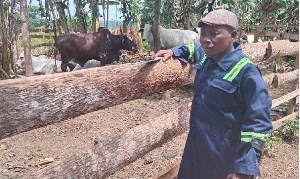Accra, Aug. 28, GNA - Dr Kwaku Afriyie, Minister of Health on Thursday charged Pharmacists to extend their services to the deprived and remote communities to ensure fair distribution of pharmaceutical care and services.
"Those in the deprived areas are the people, who need your services most and this would help reduce the incidence of self medication and over dose of drugs."
The Minister said this in a speech read for him at the opening of this year's national conference of the Pharmaceutical Society of Ghana (PSGH) in Accra.
The three-day conference, which is under the theme: "Emerging Challenges and Opportunities in Pharmacy Practice in Ghana", drew over 1,500 Pharmacists from all the Regions.
Some of the topics to be discussed include patient's rights and pharmaceutical care, veterinary pharmacy and herbal shops, required amendment in Pharmacy Act and their effects on the pharmacy practice, the changing phase of hospital pharmacy practice and their effect on community pharmacy and the health insurance scheme.
Dr Afriyie said there was the need for Pharmacists and chemical sellers to bury their differences and work in harmony to ensure that the health of the people is protected.
He said chemical sellers are mostly found in the rural areas where Pharmacists were absent and called on the PSGH to organise training programmes for the chemical sellers to improve on their service delivery in the areas of prescription of drugs to safeguard the health of the people.
The Health Minister noted that the proliferation of veterinary shops/pharmacies and herbal shops did not only pose great challenge to the pharmacy profession but the health of the citizens as well. He said the wrong administration of veterinary drugs on animals could affect humans who consume their carcasses and charged the Food and Drugs Board, the Pharmacy Council, Veterinary Medical Association and other stakeholder to correct the situation and pledge the Ministry's support in achieving that.
Dr Afriyie expressed concern about the proliferation of herbal shops and said there were many shops that sold all sorts of pharmaceutical products under the guise of herbal drugs. He said the Ministry would collaborate with the Pharmacy Council, FDB, the producers of the herbal products and stakeholders to address the problem.
Professor John S. K. Ayim, former Vice Chancellor of the Kwame Nkrumah University of Science and Technology, Kumasi commended Parliament for passing the Ghana Health Insurance Bill and said "this will pave the way for a better means of financing healthcare in the country as is being done in most developed countries".
He complained about the advertisements of herbal products and alcoholic beverages and called for a critical look into that area adding that consumption of too much bitters destroys the kidney and liver.
Prof Ayim urged Pharmacists to work hard to eliminate drug peddlers since their practice puts the health of the people at risk.
Mr Oscar Bruce, President of PSGH, said to improve the pharmacy practice in the country, the Society in collaboration with the Pharmacy Council would as from September train members in the art and science of ensuring that good pharmacy practice is achieved.
On the exodus of Pharmacists, he suggested that pharmacy graduates be engaged directly by the Ministry of Health and the Ghana Health Service as Housemen and Interns alongside the improvement of conditions of services.
"We believe strongly that if such positive measures are taken, the situation would change for the better."
The occasion was used to recognise the outstanding service of Prof. Ayim who was awarded a plaque and a citation.
Three other Pharmacists, Mr John Arthur, Professor Alfred Abaitey and Mr Felix Yellu were honoured as fellows for their contribution to the success of Society. 28 Aug.03
General News of Thursday, 28 August 2003
Source: GNA












